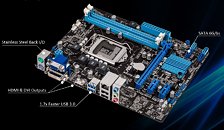Monday, February 25th 2013

ASUS Launches MicroATX Motherboards for Superior HTPC Performance
ASUS today announced a new range of microATX motherboards with onboard HDMI and DVI ports for Intel and AMD processors with integrated graphics, and USB 3.0 ports with performance-enhancing ASUS USB 3.0 Boost technology. By removing the need for a discrete graphics card, the new motherboards provide a more affordable option for home entertainment PCs that can fully exploit high-performance USB 3.0 storage.
The latest Intel 22nm CPUs feature Intel HD 4000 integrated graphics, while AMD Socket FM2Athlon and A-Series APUshave integrated AMD HD 7000 Series discrete-level Radeon GPUs.The processors provide excellent 2D and 3D graphics performance, without the need for a separate graphics card, which in turn results in lower PC build costs.The new ASUS microATX motherboards support the integrated graphics features of both processor families, and each model features both an HDMI port for use with HDTVs and a DVI port for connection to desktop displays. The ASUS B75M-A, H61M-PLUS, H61M-A/USB3 and H61M-A are microATX motherboards designed for Intel processors; the A85XM-A, A55M-A/USB3, A55M-A are for AMD APUs. The microATX form factor and reduced cooling requirements of these new motherboards make them ideally suited for compact desktop and home entertainment PCs.
Faster USB performance with exclusive USB 3.0 Boost
USB 3.0 has data-transfer speeds up to 10-times faster than USB 2.0. The new microATX motherboards announced today improve upon this further with exclusive ASUS USB 3.0 Boost technology, for data transfer speeds up to 1.7-times faster than ordinary USB 3.0.
USB 3.0 Boost uses the industry standardUSB Attached SCSI Protocol (UASP)to increase data throughput by using multiple channels in parallel, rather than just the one channel of ordinary USB 3.0. This allows USB 3.0 Boost to use the entire bandwidth of a USB 3.0 connection for significant time savings with large file transfers and smoother HD video streaming. UASP requires a UASP-enabled drive or drive enclosure to deliver its full performance benefits, but ASUS USB 3.0 Boost technology also incorporates an optimized 'turbo' mode for data transfer speed improvements from any standard USB 3.0 device.
USB 3.0 Boost is supported by the ASUS B75M-A, H61M-PLUS and H61M-A/USB3 Intel-based motherboards and the A85XM-A and A55M-A/USB3 AMD-basedmotherboards. Both onboard HDMI/DVI and USB 3.0 Boost are also available on the new ASUS Z77-A Intel-based ATX motherboard.
Superior components for incredible durability
ASUS Home Entertainment Motherboards feature high-quality solid capacitors that are industry ratedfor a lifespan of 5,000 hours at 105 degrees Celsius, which isaround 2.5-times longer than traditional capacitors. The capacitors meet strict Japanese Industrial Standards for durability and enhanced thermal capacity and, under average operating temperatures of 65 degrees Celsius, can last for over 50 years of continuous use.All models also feature chromium oxide-plated stainless steel rear I/O ports for superior corrosion resistance and an increased lifespan.
For more information, visit this page.
The latest Intel 22nm CPUs feature Intel HD 4000 integrated graphics, while AMD Socket FM2Athlon and A-Series APUshave integrated AMD HD 7000 Series discrete-level Radeon GPUs.The processors provide excellent 2D and 3D graphics performance, without the need for a separate graphics card, which in turn results in lower PC build costs.The new ASUS microATX motherboards support the integrated graphics features of both processor families, and each model features both an HDMI port for use with HDTVs and a DVI port for connection to desktop displays. The ASUS B75M-A, H61M-PLUS, H61M-A/USB3 and H61M-A are microATX motherboards designed for Intel processors; the A85XM-A, A55M-A/USB3, A55M-A are for AMD APUs. The microATX form factor and reduced cooling requirements of these new motherboards make them ideally suited for compact desktop and home entertainment PCs.
Faster USB performance with exclusive USB 3.0 Boost
USB 3.0 has data-transfer speeds up to 10-times faster than USB 2.0. The new microATX motherboards announced today improve upon this further with exclusive ASUS USB 3.0 Boost technology, for data transfer speeds up to 1.7-times faster than ordinary USB 3.0.
USB 3.0 Boost uses the industry standardUSB Attached SCSI Protocol (UASP)to increase data throughput by using multiple channels in parallel, rather than just the one channel of ordinary USB 3.0. This allows USB 3.0 Boost to use the entire bandwidth of a USB 3.0 connection for significant time savings with large file transfers and smoother HD video streaming. UASP requires a UASP-enabled drive or drive enclosure to deliver its full performance benefits, but ASUS USB 3.0 Boost technology also incorporates an optimized 'turbo' mode for data transfer speed improvements from any standard USB 3.0 device.
USB 3.0 Boost is supported by the ASUS B75M-A, H61M-PLUS and H61M-A/USB3 Intel-based motherboards and the A85XM-A and A55M-A/USB3 AMD-basedmotherboards. Both onboard HDMI/DVI and USB 3.0 Boost are also available on the new ASUS Z77-A Intel-based ATX motherboard.
Superior components for incredible durability
ASUS Home Entertainment Motherboards feature high-quality solid capacitors that are industry ratedfor a lifespan of 5,000 hours at 105 degrees Celsius, which isaround 2.5-times longer than traditional capacitors. The capacitors meet strict Japanese Industrial Standards for durability and enhanced thermal capacity and, under average operating temperatures of 65 degrees Celsius, can last for over 50 years of continuous use.All models also feature chromium oxide-plated stainless steel rear I/O ports for superior corrosion resistance and an increased lifespan.
For more information, visit this page.

14 Comments on ASUS Launches MicroATX Motherboards for Superior HTPC Performance
The story here appears to be that Asus boards have clever and widespread implementation of USB 3, and can be used in HTPCs. Welcome to 2012, Asus.
I wouldn't count B75 chipset as being all that awesome
2. Slap in an HDMI port
3. Call it an "HTPC Performance" board
4. ???
5. Profit?
Asus, hear us out pls!